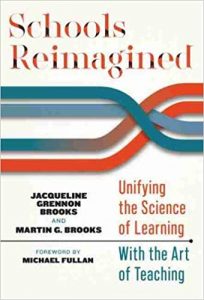Post-pandemic thoughts for parents, teachers and administrators
By Elizabeth Kahn Kaplan
Huge sighs of relief can be anticipated when local public schools reopen their doors this September — exclamations of relief not only from children and teenagers eager to resume in-person learning full time alongside their friends, not only from teachers exhausted from long hours shaping lessons onto distance-learning platforms, not only from parents, weary from assisting struggling students glued to laptops, iPads or iPhones at home while juggling or, worse yet, resigning from paid jobs, and also from business owners glad to have their employees back.
But will pre-pandemic and post-pandemic classroom learning be the same, and should it be? Should “distance learning,” supported by expanded technological resources, be granted a larger role within the classroom, with less teacher-led instruction? Which medium of delivery ensures a greater payoff of maximum learning for the resources invested?
 Two Three Village residents, educators at the top of their profession — Jacqueline Grennon Brooks, professor emerita of Teaching, Learning and Technology, Hofstra University, and her spouse Martin Brooks, executive director of Tri-State Consortium, an association of over 40 school districts in New York, New Jersey and Connecticut — agree that the key to whether or not learning takes place is not how information is delivered but if knowledge is constructed. Whether it is a teacher or a book or a computer that provides a formal lesson, the students must connect the lesson to what they already know or have experienced for true learning to occur.
Two Three Village residents, educators at the top of their profession — Jacqueline Grennon Brooks, professor emerita of Teaching, Learning and Technology, Hofstra University, and her spouse Martin Brooks, executive director of Tri-State Consortium, an association of over 40 school districts in New York, New Jersey and Connecticut — agree that the key to whether or not learning takes place is not how information is delivered but if knowledge is constructed. Whether it is a teacher or a book or a computer that provides a formal lesson, the students must connect the lesson to what they already know or have experienced for true learning to occur.
“Content alone is insufficient as a motivator for student learning: It must be combined with purpose … seen as meaningful by learners. Students learn best when engaged in learning experiences rather than passively receiving information,” according to the authors.
That theory of learning, called “constructivism,” suggests that you cannot directly impart knowledge, but you can facilitate experiences in which students construct knowledge. Jacqueline and Martin Brooks agree that the job of the teacher is to create meaningful experiences that enable the learner to do just that.
“There are kids who struggle to learn if what is being taught is not offered in a way that is particularly relevant to them. In order to figure out ways for them to have ownership of their learning, skilled teachers, interacting in person with these students, focus not only on content but concentrate on approaches that lead to critical and creative thinking.”
What many parents and children learned during the pandemic is that at-home distance learning in front of a laptop, iPad, or iPhone cannot replace in-person classroom experiences created by skillful teachers. Virtual classrooms also denied children the opportunity to develop social skills through interaction with their peers. When schools reopen in September, students, parents and teachers will welcome the opportunity for true learning to begin again.
Further reading: “Schools Reimagined: Unifying the Science of Learning with the Art of Teaching,” by Jacqueline Grennon Brooks and Martin G. Brooks (Teachers College Press, 2021).
Elizabeth Kahn Kaplan is the former director of education at the Three Village Historical Society and an educator, writer and lecturer on art, artists and American history.





